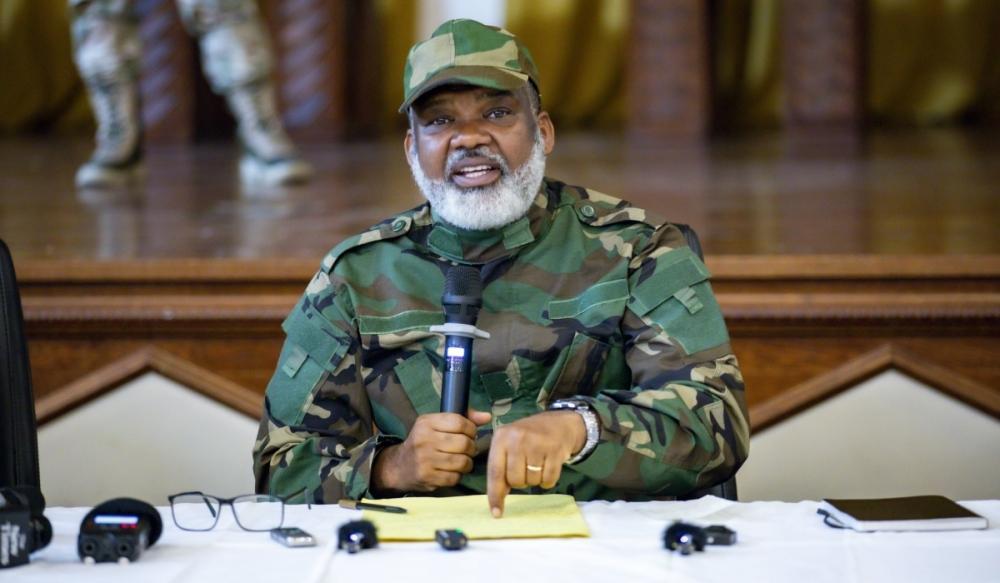Africa-Press – Rwanda. Corneille Nangaa, the leader of Alliance Fleuve Congo (AFC/M23) movement, has outlined four main reasons why his group is fighting to topple the Congolese government. He attributed the crisis in eastern DR Congo to the collapse of state institutions in what he described as a failed state, during an exclusive interview Friday, May 16, on Mario Nawfal’s popular Talk Show.
In the past few years, a vast Congolese army coalition backed by Western countries including Belgium and comprising the Rwandan genocidal militia, FDLR, and Burundian forces as well as SADC forces worsened the security situation in eastern DR Congo. FDLR is a DR Congo-backed militia formed by remnants of the perpetrators of the 1994 Genocide against the Tutsi in Rwanda. Kinshasa has relentlessly tried to drag neighbouring Rwanda into the conflict and war in its east, alleging that Kigali supports Nangaa’s bulging alliance.
Led by Nangaa, the former chairman of the Congolese national electoral commission, Alliance Fleuve Congo is fighting for governance that supports basic human rights, secures all Congolese citizens, and addresses the root causes of conflict. The rebellion has vowed to uproot tribalism, nepotism, corruption, and the genocide ideology spread by FDLR, among other vices, widespread in DR Congo.
Numerous efforts have been made at regional and international levels to resolve the crisis but are yet to produce meaningful results. According to Nangaa, the main causes of the conflict remain unaddressed, and his movement continues to seek solutions. He cited four key issues fueling the conflict:
Tshisekedi is dividing people
Nangaa accused the Kinshasa government, under President Felix Tshisekedi, of weaponizing ethnic division to marginalize specific communities, particularly the Congolese Tutsi, by denying them citizenship rights and subjecting them to violence.
“Tshisekedi’s regime has divided people, claiming a certain part of the Congolese not being Congolese, especially those who speak Kinyarwanda or who share physical features common among Tutsi communities in DR Congo. Many people have been killed and others forced into exile just for who they are,” Nangaa said.
He emphasized that such policies are detrimental in a country as diverse as DR Congo, home to over 450 ethnic groups.
“You cannot govern a country like DR Congo by limiting power to your family, tribe, or close associates. That is why AFC brings together people from different regions and communities. We believe institutional reforms are the way forward, we must identify and solve these problems through dialogue and governance together,” he added.
Failed state
The AFC leader emphasized that DR Congo is essentially a failed state, and he placed the blame squarely on President Tshisekedi.
“Tshisekedi has destroyed the army and the police, and he has corrupted all administrative institutions. We are fighting for justice and a functional state,” said Nangaa.
Illegitimate leadership
Nangaa reiterated that President Tshisekedi lacks electoral legitimacy.
“He has never won a fair election. Instead, he has imprisoned opposition leaders and sent over 200 Congolese political figures into exile, including the former President Joseph Kabila. We are fighting to rebuild a legitimate state,” he said, calling the situation in his country “unacceptable.”
Bad governance
The AFC/M23 movement’s leader accused the Congolese government of mismanagement and corruption, which he said have worsened the country’s socio-economic condition.
“Tshisekedi is a professional liar and a thief. He has dismantled institutions and is ruling as a dictator. The only language he understands is force, and that is why we are fighting,” Nangaa stated, adding that DR Congo lacks the foundational pillars required for a functioning state: a national army, an effective police force, a credible administrative system, and an impartial justice system.
“These four pillars are the bedrock of any successful nation. In DR Congo, all of them are broken.”
According to Nangaa, a stable state would promote business and national development.
He acknowledged the role of international actors in the worsening crisis but said the root cause lies within DR Congo itself.
“The UN has been in DR Congo for nearly 30 years [allegedly] to stabilize the country, but things have only been worse. When they arrived, there were fewer than 10 armed groups. Today, there are over 300. But ultimately, this is not just about the international community, we as Congolese, are to blame. We created this jungle,” he said.
Nangaa said that despite the Congolese government’s refusal to engage in direct talks, the AFC/M23 remains open to negotiations at any time and place.
Looking ahead, he said the movement is preparing for a political transition.
“We are ready to rebuild the state. We will establish functioning institutions: a professional army, police force, justice system, and conduct a national census to know the true population of DR Congo. This will lay the groundwork for development,” he said.
For More News And Analysis About Rwanda Follow Africa-Press






